- Home
- Mark Batterson
Whisper Page 7
Whisper Read online
Page 7
I can’t promise the process will be easy, but I hope you enjoy the journey. The key to learning is the love of learning. And the same is true of hearing the voice of God. It starts with longing to hear, loving to listen.
At some point most people settle for secondhand spirituality. But listening to those who listen to God is no substitute for seeking Him yourself. If you become reliant upon others for inspiration, that’s called spiritual codependency.
God wants to speak to you.
Yes, you!
One last exhortation.
Depending on your spiritual background, some of these seven languages will seem like foreign languages. That means they might take a little longer to learn. But that is often where the greatest discoveries are made.
I grew up in a church that didn’t recognize Lent. In fact, I managed to get into my second year of seminary without having any idea what Ash Wednesday was. And I didn’t discover it in a class; I discovered it as part of the studio audience at The Oprah Winfrey Show! The producer came out to brief the audience before the show began, and I turned to Lora and whispered, “He’s got dirt on his forehead.” I had a hard time not laughing out loud because I could hardly conceive of a television producer not noticing dirt on his forehead. To quote the rock band Queen, “You got mud on yo’ face, you big disgrace.”31 Well, the joke was on the seminary student who didn’t know it was Ash Wednesday.
I was in my thirties before I started observing Lent in a meaningful way. Over the years it has become a catalyst in my annual spiritual rhythm, but it wasn’t part of my dialect growing up. I had to acquire the vocabulary, and it’s become an acquired taste.
This is my prayer for you. In the pages that follow, may you learn to discern the voice of God in new ways.
God speaks through His Word. That’s our starting point. He whispers to us through doors, dreams, and desires. He converses with us through promptings, pain, and other people. Some of these languages will be more natural for you than others, but I’d wager there are ways to grow your vocabulary and become more fluent in all seven languages.
THE KEY OF KEYS
The First Language: Scripture
All Scripture is God-breathed.
—2 TIMOTHY 3:16
On April 14, 1755, General Edward Braddock sailed up the Potomac River to Georgetown, a sleepy little town on the banks of the river. The British army anchored long enough to pick up a new recruit, a twenty-three-year-old Virginia planter named George Washington. Washington served as Braddock’s aide-de-camp during the ill-fated Battle of the Monongahela, and it’s a miracle he survived. Two horses were shot out from under him, and four musket balls passed through his coat. Washington didn’t just hear musket balls whistling past his ears; he heard the still small voice whispering. “Death was leveling my Companions on every side of me,” wrote Washington in a letter to his brother. “But, by the All-powerful Dispensations of Providence, I have been protected.”1
Now let’s go back to the place where Braddock anchored his ship. In the city named after Washington, just past the place where Constitution Avenue turns into the Theodore Roosevelt Bridge, there is a nondescript stone well with a small historical marker beside it. There is a manhole cover on top of it and a ladder inside of it. Sixteen feet below the surface is a rock: Braddock’s Rock. It marks the place where General Braddock first landed, and it’s the oldest landmark in the nation’s capital.
According to legend some of that rock was used as foundation stone for the White House and Capitol. But the true significance of that stone is that it served as the starting point for the earliest surveys of Washington, DC. On old maps it’s inscribed as the Key of Keys. That was the name given to Braddock’s Rock because it established the coordinate system for the entire city. Every principal meridian and baseline was measured from that initial point.
Whether we’re aware of it or not, we all have a key of keys.
Epistemology is the branch of philosophy concerned with the nature of knowledge. It asks, “How do we know that we know?” And whether we consciously construct it or not, we all have an epistemological starting point by which we survey all of life. It establishes our moral baseline, delineating between right and wrong. For some, it fluctuates as much as the latest fad. For others, it’s as fixed as the scientific method. For me, it’s as tried and true as the Bible. And I make no apologies for that. The Bible is not just my starting point; it’s the final authority when it comes to matters of faith and doctrine. I believe the Bible to be the inspired Word of God—Truth with a capital T.
The challenge is that we live in a culture where tolerance has been elevated above truth. It’s considered wrong to say that something is wrong, and I think that’s wrong. I certainly want to be known more for what I’m for than what I’m against. And truth shouldn’t be used as a weapon. But to think that everybody is right and nobody is wrong is as silly as pretending that everybody wins and nobody loses. Come on, you know the T-ballers are keeping track of the score! And even if not keeping score works for one season in Little League, it doesn’t work in the real world. When truth is sacrificed on the altar of tolerance, it might seem as though everybody wins, but in reality everybody loses. God calls us to a higher standard than tolerance. It’s called truth, and it’s always coupled with grace.2
Grace means I’ll love you no matter what.
Truth means I’ll be honest with you no matter what.
That’s my principal meridian.
Now let me back up just a bit.
Prized Possession
I have a twenty-five-year addiction that started with the eight-hundred-page biography of Albert Einstein I read in college.3 I fell in love with books, and I started reading anything and everything I could get my hands on. Part of that love of learning was Einstein’s exhortation in that very book: “Never lose a holy curiosity.”4 Part of it was pure necessity.
When I started pastoring National Community Church, I lacked both ministry experience and life experience. My ministry résumé included one summer internship and one failed church plant. That’s it. My life experience amounted to just twenty-five trips around the sun, and it was a rather sheltered existence at that. I needed to borrow as much experience as I could, and I did that through books.
Around that time I heard that the average author invests approximately two years of life experience into every book he or she writes, so I figured I was gaining two years of life experience with every book I read. In my twenties I averaged reading more than two hundred books a year, so I was gaining four hundred years of life experience each year! To date, I’ve read at least thirty-five hundred books, so I’m at least seven thousand years old in book years!
Simply put, I love books. But one book falls in a category of its own: the Bible. At least two things make the Bible absolutely unique. First, it is “living and active.”5 We don’t just read the Bible; the Bible reads us. The Spirit who inspired the ancient writers as they wrote is the same Spirit who inspires modern-day readers as they read. The Holy Spirit is on both sides of the equation. The apostle Paul described Scripture as “God-breathed.”6 When we read Scripture, we’re inhaling what the Holy Spirit exhaled thousands of years ago. We’re hearing the whisper of God in breath tones.
Second, we never get to the bottom of the Bible. According to rabbinic tradition, every word of Scripture has seventy faces and six hundred thousand meanings.7 In other words, it’s kaleidoscopic. No matter how many times we read the Bible, it never gets old, because it’s timeless and timely.
The Bible was composed by more than forty writers over fifteen centuries in three languages on three continents. Those authors range from farmers and fishermen and kings to poets, prophets, and prisoners of war. It covers nearly every subject matter under the sun: law and history, poetry and prophecy, cosmology and theology. Yet despite the fact that it touches on hundreds of controversial topics, it doesn’t con
tradict itself.8 In fact, it reads like one book from start to finish. And that’s because there is one Author, the Spirit of God.
We take the Bible for granted, and I think that’s because we can get it in dozens of different translations with any type and color of cover we want. But let’s not forget that ancient scribes would devote entire lifetimes to making one copy of the sacred text, and translators such as John Wycliffe and William Tyndale gave their lives to provide us their translations.
My most prized earthly possession is a time-tattered Bible that belonged to my grandfather Elmer Johnson. The pages of the third improved edition of the 1934 Thompson Chain-Reference Bible are worn thin from use, so thin that my grandfather had to tape them together. I love reading the verses he underlined and the notes he scribbled in the margins. This might sound mystical, but that Bible connects me to my grandfather in a way that escapes words. And his well-used Bible is a testament to his well-lived life. It reminds me of something Charles Spurgeon said: “A Bible that’s falling apart usually belongs to someone who isn’t.”9
Bibliolatry
Reading the Bible cover to cover is a spiritual best practice, and there is no better way to learn to discern God’s voice. Theologian J. I. Packer went so far as to say, “Every Christian worth his salt ought to read the Bible from cover to cover every year.”10 Most of us fall short on that count, but it’s hard to argue with, isn’t it? However, the goal isn’t getting through the Bible; the goal is getting the Bible through us.
There is a very subtle form of idolatry called bibliolatry. It involves treating the Bible as an end in itself instead of a means to an end. The goal of Bible knowledge isn’t just Bible knowledge. After all, “knowledge puffs up.”11 The goal is learning to recognize and respond to your heavenly Father’s voice so you can grow in intimacy with Him.
But make no mistake, the Bible can be misused and abused. You have to look no further than the devil himself, who tried to use Scripture to tempt Jesus: “If you are the Son of God, tell this stone to become bread.”12 That was a low blow, considering that Jesus had been fasting for forty days. But we do the same thing when we use truth to bully others. Yes, the Bible is our sword. It’s our best offense, our best defense. But when we misinterpret the truth, we’re abusing the Bible. Remember how Jesus responded? By rightly dividing the Word: “Man does not live on bread alone.”13
We need to heed Paul’s exhortation: “Study to shew thyself approved unto God, a workman that needeth not to be ashamed, rightly dividing the word of truth.”14 If we don’t rightly divide the Word of God, we divide the body of Christ. And that’s the opposite of holiness, which means “wholeness.”
I have a little formula that I share quite frequently: the Holy Spirit + caffeine = awesome. As the pastor of a church that owns a coffeehouse, I’m not joking. And my office is right above the coffeehouse! But here’s a more serious equation: Holy Scripture – Holy Spirit = bibliolatry. When we take the Holy Spirit out of the equation, we’re left with the letter of the law. And the letter of the law isn’t life giving. What you end up with is rule lawyering like the Pharisees and a lifeless religion called legalism.
One of the jobs of the Holy Spirit is quickening, and it’s the difference between information and transformation. Ironically, quicken is the same word used to describe physical resurrection.15 In much the same way, the Holy Spirit defibrillates our spirits with His Word so we experience a little resurrection every time we read God’s Word.
He brings dreams back to life.
He revives faith, hope, and love.
He delivers on promises we’ve given up on.
The Transitive Property
On the morning of August 16, 1996, I was just three verses into the book of Joshua when God quickened a promise that jumped off the page and into my spirit.
I will give you every place where you set your foot, as I promised Moses.16
As I read that promise, I felt prompted to pray a perimeter all the way around Capitol Hill, the place God had called us to pastor. I immediately embarked on a 4.7-mile prayer walk, which I detail in The Circle Maker. When I prayed that prayer, I never thought we’d own a single piece of property, and that wasn’t the original intent. But God has reasons that are often beyond human reason. Two decades later we own half a dozen properties, valued at more than $50 million, on that prayer circle. Coincidence? I think not.
One of those miracle properties is a 125-year-old castle that sits on a city block we purchased for $29 million. First of all, I did not have a category for that kind of price tag twenty years ago. I still don’t. But it’s no coincidence that we signed the contract on the castle eighteen years to the day after I prayed that circle. My point? Each of those properties was once a whisper. That quickening had a net worth of at least $50 million, and it continues to compound interest.
I know some would argue that this promise was meant for Joshua, not me. Trust me, I don’t believe in pulling God’s promises out of a hat like a rabbit and claiming them out of context. But let me push back a little on this point. This promise wasn’t even for Joshua in the first place; it was for Moses. So there is a transitive property at play. Just as God transferred that promise from Moses to Joshua, God transferred that promise from Joshua to me. If that seems like a stretch, remember what 2 Corinthians 1:20 says: “No matter how many promises God has made, they are ‘Yes’ in Christ.” If you’re in Christ, all of God’s promises belong to you. Each one has your name on it, and the Spirit will quicken different promises at different times. It’s one of the ways God whispers.
When Christ returns, the Spirit of God will quicken our earthly bodies. Bodies that are buried six feet deep will be unearthed, and those that have been cremated will rematerialize. But He quickens in more ways than one. Sometimes it’s a thought that fires across our synapses. Sometimes it’s a prompting to step up, step in, or step out in faith. Sometimes it’s speaking the right word at the right time. And sometimes it’s a verse of Scripture that jumps off the page and into our spirits.
The psalmist said, “Quicken thou me according to thy word.”17 That word quicken is repeated no less than eleven times in the King James Version of Psalm 119. When the Bible says something more than once, we ought to listen to it at least twice.
This may be a little grotesque, but let me paint a picture in a way you probably won’t forget. I was channel surfing recently when I came across a rerun of Mission: Impossible III, starring Tom Cruise, who plays the role of Impossible Missions Force agent Ethan Hunt. I landed there right when a micro-explosive device was shot through his nose and implanted in his brain. Sorry, that’s the grotesque part. And this is a crude example. But the quickening of the Holy Spirit is like a truth bomb that gets implanted in your mind, your heart, and your spirit. When you hide His Word in your heart, you never know when the Spirit of God will make it go off. And that’s a good thing!
Here’s how it works for me. I usually open my Bible to wherever I left off in my reading plan. I start reading and keep reading until I come to a verse that gives me cause to pause. Sometimes I find the text confusing, so I’ll do some additional research. Sometimes I find the text convicting, which leads to confession. And sometimes the text sparks a prompting that I pray into.
One minor caution at this point. Some people employ a flip-and-point approach to the Bible. It’s like the guy who was looking for a little inspiration, so he flipped his Bible open and pointed to the verse that says “[Judas] went away and hanged himself.”18 That wasn’t very inspiring, so he tried it again. The next verse he flipped to said “Go and do likewise.”19
I would highly recommend a more methodical approach to the Bible. Why not download a reading plan from YouVersion and read it cover to cover? I’d even recommend a new translation every few years to keep the Word fresh. One way or another, get into God’s Word so His Word gets into you. Then the Holy Spirit can quicken it when and where and how He w
ants.
Deeper Than Cortex
At the age of just twenty-eight, Denny McNabb suffered arrhythmic heart failure. He was resuscitated, but ten minutes without oxygen caused irreparable brain damage. The associate director of East Central Illinois Campus Life lost his memory and with it his history and personality. Denny came out of a coma thirty days later, but he didn’t recognize family or friends. He repeated the same question over and over. And his brain became like Teflon; nothing seemed to stick.
My friend and spiritual father, Dick Foth, had an appointment scheduled with Denny the day of his heart attack. That appointment turned into months of hospital visits and some agonizing questions. Chief among them was, how could God let this happen? One day Dick took out his frustration on a hospital elevator, almost breaking his hand. That’s when he heard God’s gentle whisper: Dick, I can handle any question you ask Me. You just don’t have a large enough frame of reference to handle the answer.
We’ll dive deeper into some of those difficult questions when we explore the language of pain, but it’s worth citing something C. S. Lewis said: “Can a mortal ask questions which God finds unanswerable? Quite easily, I should think. All nonsense questions are unanswerable. How many hours are there in a mile? Is yellow square or round? Probably half the questions we ask—half our great theological and metaphysical problems—are like that.”20
What Lewis meant, I think, is that our questions are often the wrong questions because they are based on such a small frame of reference. You and I aren’t smart enough to ask the right questions because we think in finite categories.
About six months after the heart attack, Dick was visiting Denny in the hospital. On a spur of the moment or a spur of the Spirit, he said, “Denny, do you remember this? ‘For God so loved the world that he gave his only begotten Son’…” Dick stopped quoting midverse. Denny, who couldn’t remember a thing, got a faraway look in his eyes. Then he finished the sentence: “…that if I believe in him, I won’t die anymore.”21 Dick could hardly believe his ears. He said, “Do you remember this?” and started singing, “Jesus loves me this I know for the Bible tells me so.”22 Denny picked it up on key and sang it all the way to the end.

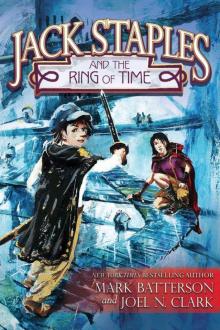 Jack Staples and the Ring of Time
Jack Staples and the Ring of Time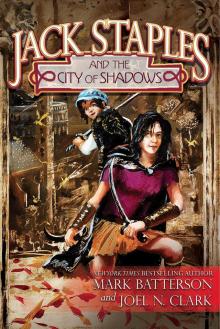 Jack Staples and the City of Shadows
Jack Staples and the City of Shadows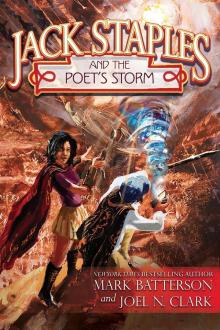 Jack Staples and the Poet's Storm
Jack Staples and the Poet's Storm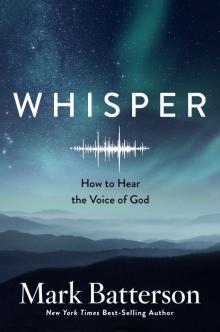 Whisper
Whisper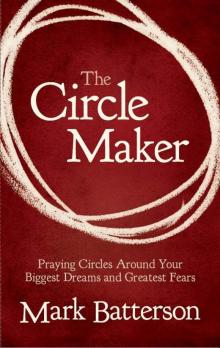 The Circle Maker_Praying Circles Around Your Biggest Dreams and Greatest Fears
The Circle Maker_Praying Circles Around Your Biggest Dreams and Greatest Fears